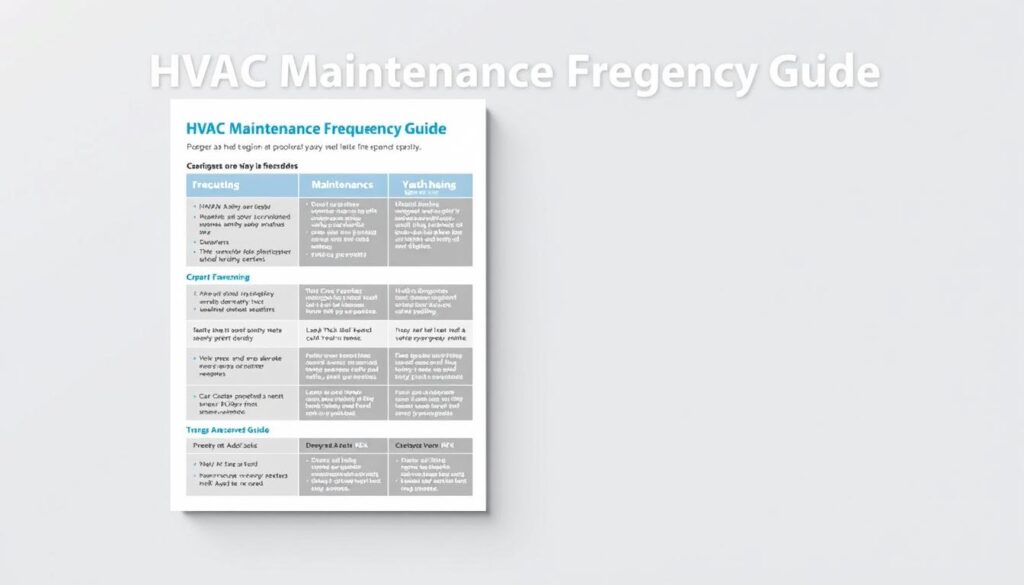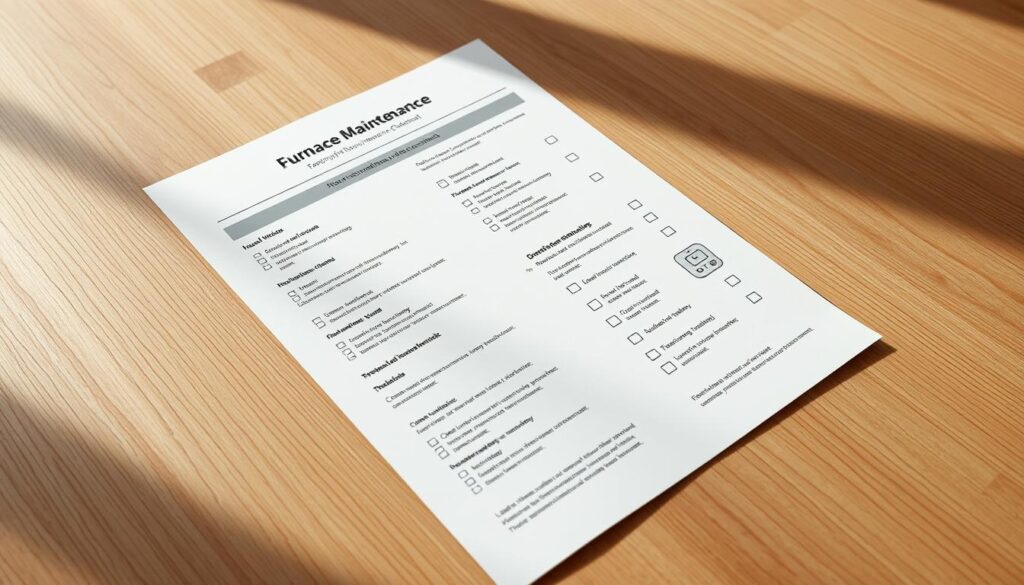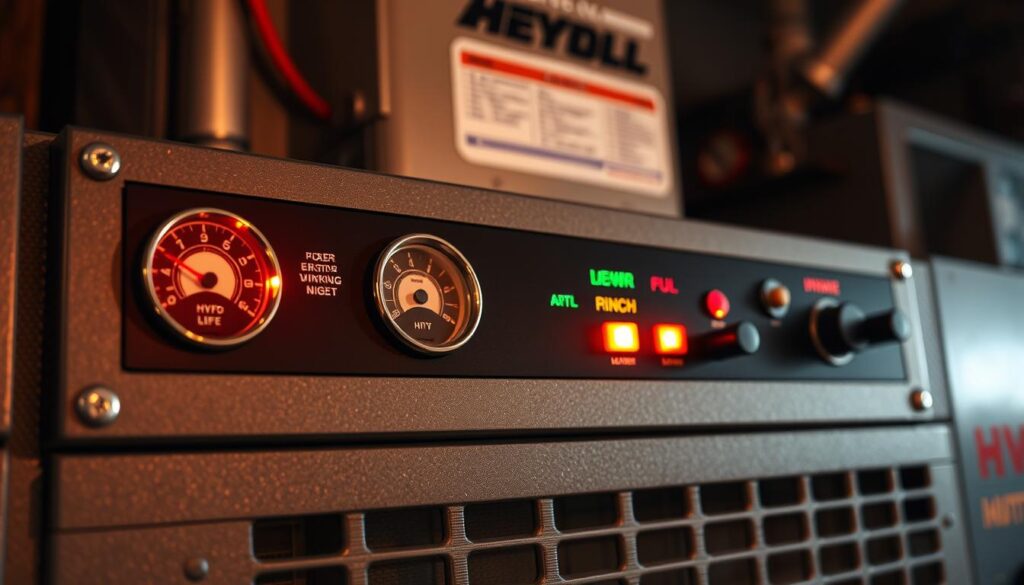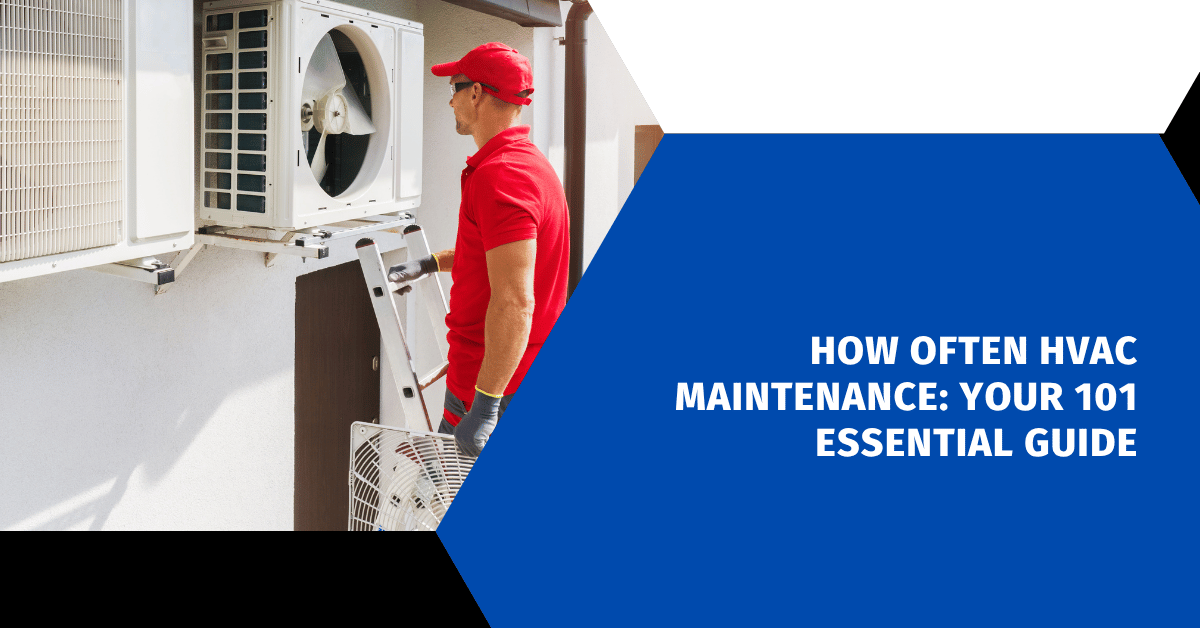Affiliate Disclosure
HVAC Guide Guys is a participant in the Amazon Services LLC Associates Program, an affiliate advertising program designed to provide a means for sites to earn advertising fees by advertising and linking to Amazon.
How Often HVAC Maintenance? Are you unknowingly shortening the lifespan of your home’s most expensive comfort system? Many homeowners overlook the critical importance of regular HVAC system servicing frequency. This can lead to costly repairs and reduced efficiency.

Your HVAC system is the heart of home comfort, silently working to maintain the perfect temperature throughout the year. With about two-thirds of home energy dedicated to heating and cooling, understanding how often HVAC maintenance should occur becomes critical. It’s key for both performance and cost savings.
This guide will unpack the mysteries of HVAC maintenance. It will reveal expert insights into optimal servicing schedules. These can save you money, extend your system’s life, and ensure consistent home comfort.
Key Takeaways
- Regular maintenance prevents unexpected system breakdowns
- Professional servicing can improve energy efficiency
- Proper maintenance extends HVAC system lifespan
- Seasonal check-ups are critical for optimal performance
- Proactive care reduces long-term repair costs
Table of Contents
Understanding the Importance of Regular HVAC Maintenance
Your HVAC system is key to home comfort and efficiency. Regular inspections are vital to keep it running well and avoid sudden failures. This approach to care keeps your home cozy and protects your equipment.
The Role of Preventive Care in System Longevity
Regular maintenance can make your HVAC system last longer. Here are some benefits of inspections:
- Reduces wear and tear on critical components
- Identifies problems early, before they get big
- Keeps your system running at its best
- Avoids expensive and unexpected repairs
Impact on Energy Efficiency and Cost Savings
A well-kept HVAC system uses less energy. Regular maintenance can help you save money by:
| Maintenance Action | Potential Energy Savings |
|---|---|
| Annual Professional Inspection | Up to 15% less energy costs |
| Regular Filter Replacement | 5-10% better system efficiency |
| Cleaning Air Ducts | Up to 20% better airflow |
Protection of Manufacturer’s Warranty
Most HVAC makers need documented regular maintenance to keep your warranty valid. Skipping these checks could void your warranty and cost you a lot to fix.
“An ounce of prevention is worth a pound of cure” – this is true for your HVAC system.
By focusing on regular inspections and care, you’re not just fixing a machine. You’re keeping your home comfortable, saving money, and ensuring peace of mind.
How Often HVAC Maintenance Should Be Performed
Knowing when to do HVAC maintenance is key to keeping your home comfortable. Most HVAC pros say you need a plan that fits your system and how you use it.
For air conditioners, you should get two main services a year:
- Spring maintenance for cooling systems
- Fall maintenance for heating systems
How often you need maintenance depends on a few things:
- System age: Older systems need more checks
- How much you use it
- Your local weather
- What the maker says
For most homes, getting your HVAC checked twice a year is best. This keeps it running well, saves energy, and makes it last longer.
Regular maintenance is your best defense against costly repairs and premature system replacement.
While pros are important, you can do some things at home. Change air filters often and keep outdoor units clean.
Explore Our HVAC Shop
Looking for top-rated HVAC tools, parts, and accessories? Visit our shop and find the perfect solution for your needs.
Visit the ShopSeasonal Maintenance Schedule for Your HVAC System
Keeping your HVAC system in top shape all year is key. It ensures your heating and cooling work well and avoids sudden failures.
Regular HVAC checkups are vital for your system’s health. A detailed maintenance plan can save you money and avoid expensive fixes.
Spring Preparation for Cooling Season
When it gets warmer, your cooling system needs extra care. Important tasks include:
- Clean or replace air filters
- Inspect refrigerant levels
- Clean condenser coils
- Check electrical connections
- Test thermostat functionality
Fall Preparation for Heating Season
Getting your heating ready for winter is a must. Key fall maintenance steps are:
- Inspect heat exchanger
- Clean furnace burners
- Check ignition system
- Lubricate moving parts
- Verify safety controls
Year-round Maintenance Tasks
Some tasks should be done all year to keep your HVAC in good shape:
- Monitor system performance
- Keep outdoor units clear of debris
- Listen for unusual noises
- Check for any strange odors
- Maintain proper airflow around vents
Pro tip: Schedule professional seasonal hvac checkups twice a year to catch problems early and keep your system running smoothly.
Essential Air Filter Maintenance Guidelines
Keeping your HVAC system’s air filters clean is key for top performance and energy savings. Regular changes in your HVAC filters can greatly improve your home’s air quality and your system’s efficiency.
Different air filters need different care schedules. Knowing these needs helps your HVAC system work better and stay energy-efficient.
- 1-2 inch filters: Replace every 30-90 days
- 3-4 inch filters: Replace every 6-9 months
- 5-6 inch filters: Replace every 9-12 months
Several things can affect when you need to replace your filters:
- Indoor air quality
- Number of pets
- Presence of allergies
- Home renovation activities
| Filter Type | Replacement Frequency | Impact on HVAC Efficiency |
|---|---|---|
| Fiberglass | 30 days | Low |
| Pleated | 90 days | Medium |
| HEPA | 6-12 months | High |
Pro tip: Check your filter monthly and replace it when visibly dirty, regardless of the recommended timeframe.
Clean filters can reduce energy consumption by 5-15% and improve your HVAC system’s overall performance.
Being proactive with hvac filter changes can make your system last longer. It also improves indoor air quality and keeps your HVAC system running at its best.
Professional Air Conditioning Maintenance Checklist
Keeping your HVAC system in top shape is key for its performance and life span. A pro air conditioner maintenance schedule includes a detailed checklist. Knowing when to service your HVAC system helps avoid sudden failures and expensive fixes.
Experts use a structured method for air conditioning upkeep. Your HVAC needs skilled care to run well and save energy.
Cleaning and Inspection Tasks
- Thoroughly clean evaporator and condenser coils
- Inspect and clear condensate drain lines
- Check ductwork for leaks or damage
- Remove debris from outdoor unit
- Lubricate moving parts
Component Testing and Calibration
| Component | Testing Procedure |
|---|---|
| Refrigerant Levels | Precise pressure and volume measurement |
| Electrical System | Comprehensive connection and voltage check |
| Compressor | Performance and efficiency evaluation |
| Thermostat | Calibration and accuracy verification |
Performance Evaluation Metrics
Your HVAC pro will check important performance signs, such as:
- Temperature difference between supply and return air
- Airflow volume and consistency
- System efficiency rating
- Energy use analysis
Regular maintenance stops system failures and cuts down energy costs over time.
Explore Our HVAC Shop
Looking for top-rated HVAC tools, parts, and accessories? Visit our shop and find the perfect solution for your needs.
Visit the ShopFurnace Maintenance Requirements and Timing
Keeping your furnace in top shape is key for a cozy and safe home. Knowing when to get your furnace tuned up can boost its performance and life span.

Your furnace needs regular care to work well. Experts say you should get it checked once a year, usually before it gets cold. The best time for a tune-up is early fall, so your furnace is ready for winter.
- Recommended annual maintenance in September or October
- Critical for preventing unexpected breakdowns
- Helps maintain optimal system efficiency
During maintenance, pros do a thorough check. They look at:
- Inspecting heat exchanger for cracks or damage
- Cleaning burners and ignition system
- Checking and adjusting gas pressure
- Lubricating moving mechanical parts
- Testing safety controls
| Furnace Age | Recommended Maintenance Frequency | Key Considerations |
|---|---|---|
| 0-5 years | Annual | Minimal wear, preventive care |
| 6-10 years | Annual with detailed inspection | Potential component wear begins |
| 10+ years | Bi-annual or as recommended | Higher risk of system failure |
Pro tip: Older furnaces or those used a lot might need more frequent checks to keep working well.
Regular maintenance isn’t just about preventing breakdowns – it’s about protecting your investment and ensuring your home stays comfortable year-round.
Heat Pump and Mini-Split System Maintenance Specifics
Heat pumps and mini-split systems are new HVAC solutions. They need special care to last longer. These systems need more detailed maintenance than regular heating and cooling units.
It’s important to know how to take care of heat pumps and mini-split systems. This ensures they work well and last longer. How often you service your HVAC system is key to keeping these advanced systems in top shape.
Bi-annual Service Requirements
Experts say you should get your heat pumps and mini-split systems checked twice a year. This is for:
- Spring maintenance to get ready for cooling
- Fall maintenance to get ready for heating
Special Considerations for Different Systems
Every heat pump and mini-split system has its own needs. You should focus on:
- Indoor and outdoor unit cleaning
- Condensate drain inspection
- Refrigerant level checks
- Reversing valve functionality testing
- Individual air handler maintenance
Regular professional checks and following the manufacturer’s advice can make your system more efficient. It also helps avoid expensive repairs.
Explore Our HVAC Shop
Looking for top-rated HVAC tools, parts, and accessories? Visit our shop and find the perfect solution for your needs.
Visit the ShopDIY HVAC Maintenance Tasks You Can Perform
Preventive HVAC care doesn’t always need a pro. Homeowners can do many tasks to keep their system working well. This can also make it last longer.
Changing your hvac filters is a key DIY task. Keeping filters clean helps your system run better and improves air quality indoors. Here’s how to do it right:
- Check filters every 1-3 months
- Remove and inspect air filters carefully
- Clean or replace filters based on manufacturer recommendations
There are other simple tasks to help your HVAC system stay healthy:
- Clear debris around outdoor units
- Clean visible dust from vents and registers
- Ensure indoor vents remain unobstructed
- Visually inspect ductwork for any damage
Safety tip: Always know your limits. Don’t try to fix complex issues like electrical parts or refrigerant. It’s better to let certified HVAC pros handle it. Your goal is to help your system work better, not to cause harm.
Regular DIY maintenance can help prevent costly repairs and extend your HVAC system’s operational life.
Signs Your HVAC System Needs Immediate Maintenance
Catching HVAC problems early can save you a lot of time and money. Regular inspections help find issues before they get expensive. Your system shows signs of trouble that need quick action.

Spotting performance issues is key to keeping your HVAC efficient. Look out for these important warning signs:
- Inconsistent temperatures across different rooms
- Weak or reduced airflow from vents
- System running continuously without reaching desired temperature
- Unexpected increases in energy bills
Performance Warning Signs to Watch
Your HVAC system sends out subtle messages. Inconsistent cooling or heating often means ductwork, refrigerant, or mechanical problems. If your system can’t keep temperatures right, it’s time for a pro to check it out.
Unusual Sounds and Smells
Strange noises can point to big mechanical issues. Keep an ear out for:
- Banging sounds suggesting loose components
- Whistling indicating air leaks
- Grinding noises hinting at motor problems
- Musty odors potentially signaling mold growth
- Burning smells that might indicate electrical issues
Regular maintenance through HVAC inspections can stop unexpected breakdowns. It keeps your system running well. Don’t ignore these signs – they’re your system’s way of asking for help.
Cost Benefits of Regular HVAC Maintenance
Regular HVAC care is more than keeping your system running. It’s a smart move that saves you money over time. By focusing on maintenance, you get many benefits that make every dollar count.
Your HVAC’s energy efficiency affects your monthly bills. A well-kept system can cut energy use by up to 30%. This means big savings. Think of maintenance as a tune-up for your system.
- Reduced energy bills through optimal system performance
- Prevention of costly emergency repairs
- Extended equipment lifespan
- Maintained manufacturer warranty coverage
Regular checks catch problems early, saving you from big repairs. Proactive care is always more cost-effective than reactive repairs.
Think about the long-term savings. Spending a bit on annual maintenance can save you hundreds or thousands. Your HVAC system is a big investment. Keeping it in good shape is a smart financial choice.
Explore Our HVAC Shop
Looking for top-rated HVAC tools, parts, and accessories? Visit our shop and find the perfect solution for your needs.
Visit the ShopProfessional vs. DIY Maintenance: What You Need to Know
Keeping your HVAC system in top shape is a mix of professional help and your own efforts. Knowing what you can do yourself and what needs a pro is key. This balance helps your system last longer and work better.
Regular checks of your HVAC system are essential. Some upkeep tasks are easy for homeowners. But others need special skills and tools.
Tasks Best Left to Professionals
- Refrigerant level checks and handling
- Electrical component testing and repair
- Internal system cleaning and detailed diagnostics
- Complex calibration of system parts
- Detailed performance checks
Safe DIY Maintenance Activities
- Changing air filters every 1-3 months
- Cleaning vents and ducts you can reach
- Keeping outdoor units free of debris
- Watching how your system performs
- Adjusting thermostat settings
Getting your HVAC system checked by pros at least twice a year is smart. They can spot problems early, saving you from big repair bills.
Always ask a certified HVAC tech if you’re unsure about a maintenance task. This helps avoid damaging your system.
| Maintenance Type | Professional | DIY |
|---|---|---|
| Complexity | Needs high technical skill | Can be done with basic skills |
| Tools Needed | Requires special tools | Uses common household tools |
| Risk Level | Low risk with expert care | Moderate risk, needs caution |
Following these maintenance tips helps protect your HVAC investment. It ensures your home stays comfortable and energy-efficient.
Conclusion
Knowing how often to maintain your HVAC is vital for your home’s comfort and efficiency. A proactive maintenance plan keeps your heating and cooling systems running smoothly. This way, you avoid unexpected breakdowns and expensive repairs.
Regular care and professional checks are essential for your HVAC’s longevity. Keeping your system well-maintained not only extends its life but also boosts its performance. This means less energy use and lower bills. Simple, regular tasks can prevent big problems later on.
By taking care of your HVAC, you show smart management of your home. Annual professional services and some DIY efforts ensure a cozy home. This also protects your big investment in your home. Stay ahead, be proactive, and enjoy reliable HVAC performance every year.
Preventive maintenance is cheaper than fixing things when they break. Take good care of your HVAC, and it will give you comfort, better air, and reliability for years.

